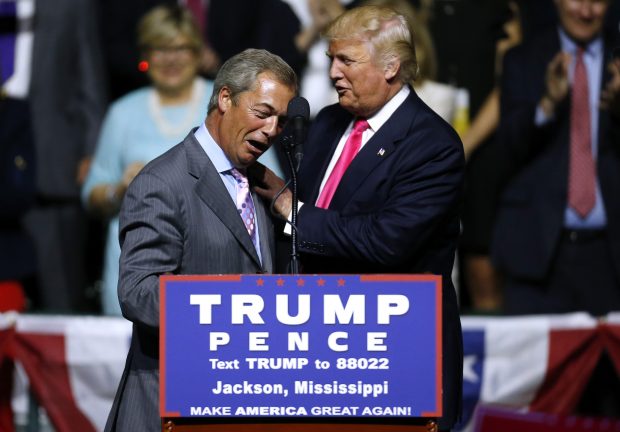Polite British eurosceptics still insist that Brexit isn’t Trump and Trump isn’t Brexit — as if that meant anything at all. Many of us Britons like to think that our populist revolt is a more civilized affair than the one happening across the Atlantic.
As London prepares to welcome President Trump next week, it may be time for the British to admit that we have been deluding ourselves. The truth is that Trump is the sun to the Brexit moon. Some mysterious cosmic magnetism always seems to pull them together.
Nigel Farage might call it destiny.
Look at recent history. On June 24, 2016, the day after the EU referendum, Donald Trump arrived by helicopter at Turnberry, his golf course in Scotland. The financial markets were spooked and the political system was beginning its great Brexit freakout. But the then-candidate (still not even party nominee) Mr Trump offered his words of wisdom. ‘You just have to embrace it,’ he said. ‘It’s the will of the people. … I love to see people take their countries back.’ The assembled press pack didn’t listen (Trump being Trump, he has since claimed repeatedly that he came to Scotland the day before the referendum result and predicted that Brexit would happen. None of his circle seems willing to correct him. America’s 45th president creates his own reality).
The next time Trump came to Britain was on the very day Theresa May’s Chequers Agreement for withdrawing from the European Union was published. Nigel Farage might call it fate. He duly announced she had ‘wrecked’ Brexit. British politicians were infuriated, though many Britons agreed with him. Trump also said that he had given May some advice on how to get a better deal from Brussels. May revealed that the American Commander-in-Chief had told her to sue the European Union, and everybody tittered at the stupidity of the idea. Now, May has resigned, a bitter failure. Perhaps she should have listened.
On Monday, a week after a tumultuous European Election, as the nation braces itself for a new Prime Minister, Donald Trump will land in Britain again. Various political figures have issued their all-too-familiar declarations of disgust: the leader of the opposition Jeremy Corbyn, the leader of the Liberal Democrats Vince Cable and the speaker John Bercow (who, funnily enough, went to Washington this week) have all expressed their disapproval of the American president. British politicians are specialists in grandstanding.
Everybody in Britain expects that Trump will gaffe spectacularly during his visit next week, that he will breach some important protocol and say something untoward. Even many Brexiteers think the timing is unfortunate. They feel the president’s toxic image will damage their cause at a crucial moment and mobilize the opposition.
No doubt it will do the latter. There will be another round of Trump protests on the streets of London on Monday. These are meant to show the president the low regard in which he is held. But Trump doesn’t care, and many Britons are embarrassed by these rather rude displays of ill-will towards the head of state of our greatest ally.
Trump is almost bound to make some minor faux pas that will be deemed a grave insult. Last year he was fiercely criticized for standing in the way of the Queen as she showed him the Coldstream Guards. Commentators who normally couldn’t care less about royal etiquette pretended to be offended. Her Majesty has had to suffer far greater indignities in the name of diplomacy. Compared to Nicolae Ceausescu, Robert Mugabe, or even Mohammed bin Salman, all of whom have enjoyed royal welcomes at Buckingham Palace, Trump is a saint.
The truth is that Trump is an ally of Brexit, one Britain can ill-afford to shun. The British government ought to take advantage of his boldness when it comes to trade. In the first weeks of his administration, he made overtures toward the UK about the ‘beautiful’ bilateral trade deal he wanted to strike. But Theresa May was reluctant to embrace the offer, fearing it would cause legal difficulties with the European Union.
Her timidity was a great mistake: no sane analyst believes that America could instantly replace the European Union as a trading partner, but the offer of a new free trade agreement with the world’s most powerful economy should never be ignored. At the very least, May could have used the possibility of a deal as ‘leverage’ — to use one of the President’s favorite terms
— in her dealings with the EU.
Her successor, whoever it is, should seek immediately to capitalize on Team Trump’s enthusiasm for Brexit, and his eagerness to pressure Europe into lowering its barriers to American agricultural exports. It’s been almost three years since Brexit and Trump won, and time is running out.

























